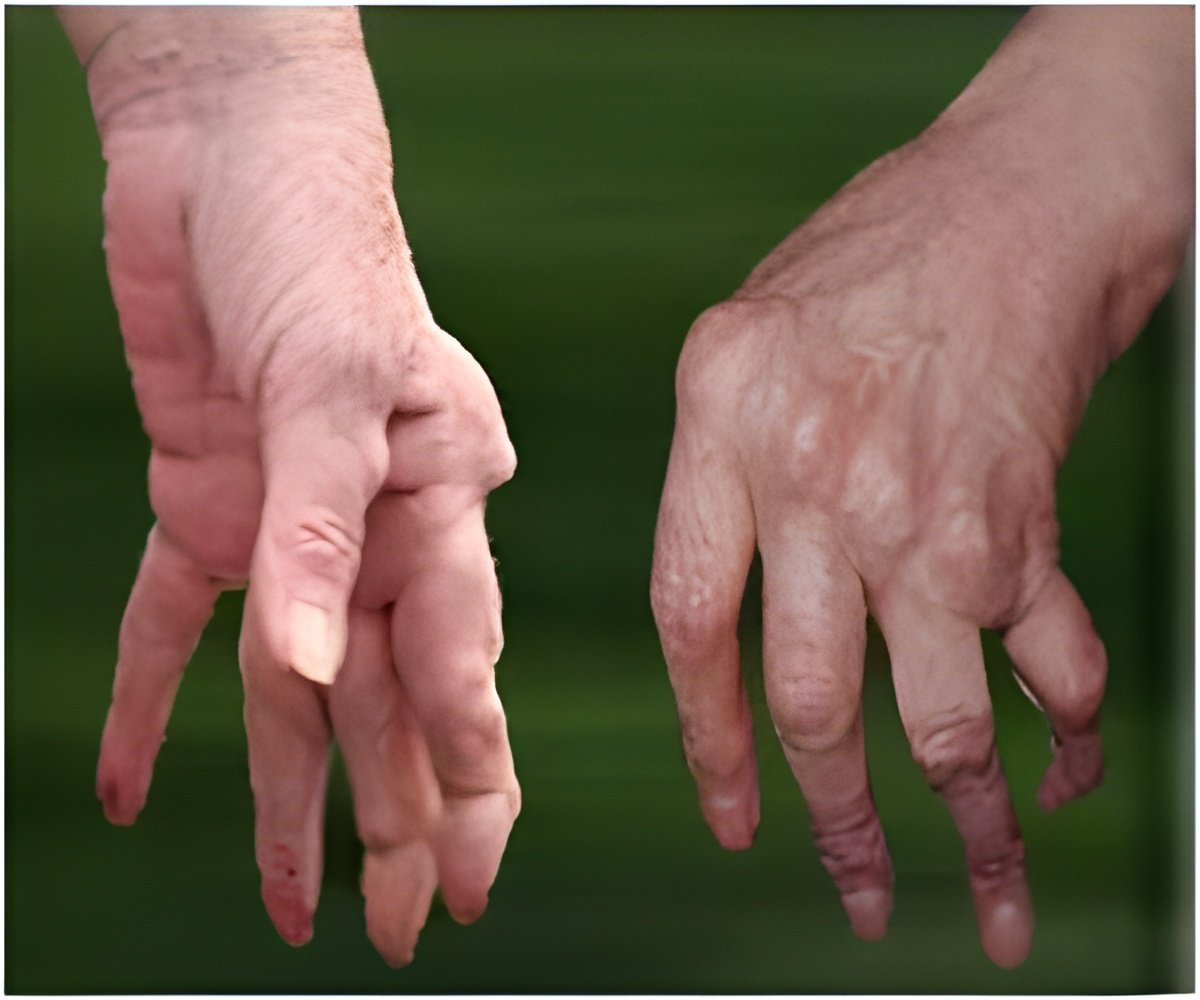Patients with rheumatoid arthritis who have low levels of inflammation have lower risk for heart complications and stroke

Chronic inflammation caused by RA has been linked to heart disease and stroke. Previous studies have shown the amount of time a person has RA as a more important risk factor than the inflammation that accompanies it. Researchers from the Radboud University Nijmegen Medical Centre in the Netherlands recently investigated the relationship between the years of inflammation and the risk of heart disease and stroke in people with RA.
"Identifying risk factors that accurately predict cardiovascular disease in RA is important for effective prevention in these patients. In addition to traditional risk factors such as smoking and high cholesterol levels, inflammation seems to be an important cause of cardiovascular disease in RA," says Elke.E.A. Arts, MSc; junior research associate in the Department of Rheumatology at Radboud University Nijmegen Medical Centre in the Netherlands and lead investigator of the study.
Dr. Arts also adds, "generally, the inflammatory response is a useful feature of our immune system, protecting the body from harmful stimuli such as an infection and initiating the healing process. However, RA patients are exposed to ongoing, chronic systemic inflammation, which may be destructive rather than beneficial. Although inflammation has been linked to atherosclerosis, the dynamics of the relationship between inflammatory activity in RA and the development of actual cardiovascular disease in RA requires further research. As the level of disease activity does not appear to contribute to the excess risk of CVD in RA, the time a patient is exposed to inflammation or disease duration, may be of importance."
Eight-hundred-fifty-five RA patients without a history of heart disease or stroke were included in the study, and scored to show the amount of disease activity each person was experiencing over time. Among the 855 patients, the average age was 54 years old − of which 66 percent were female, and 76 percent tested positive for rheumatoid arthritis through a blood test.
Of all participants, a total of 6,388 years of data was collected, and the researchers analyzed the relationship between years of inflammation and the occurrence of stroke and heart disease. Next, the researchers estimated the probability of developing heart disease within the first 10 years of being diagnosed with rheumatoid arthritis and compared this to the risk after more than 10 years of RA disease.
Advertisement
Dr. Arts further comments, "the finding that, in RA, the level of inflammation is not associated with the occurrence of cardiovascular disease, means that a small amount of inflammation appears to be sufficient to increase the risk of CVD. Only when disease activity is so low that it is hardly present, is the risk of CVD reduced. Hence, treatment of disease activity to achieve remission is not only important to prevent joint destruction and functional losses but perhaps also to decrease the risk of cardiovascular morbidity and mortality in these patients."
Advertisement
###
Editor''s Notes: Elke. E.A. Arts, MSc, will present this research during the ACR Annual Scientific Meeting at McCormick Place Convention Center at 1:30 PM on Monday, November 7 in Room A 314. Dr. Arts will be available for media questions and briefing at 1:30 PM on Monday, November 7 in the on-site press conference room, W 175C.
Learn more about living well with rheumatic disease as well as rheumatologists and the role they play in health care. Also, discover the ACR''s Simple Tasks campaign, which highlights the severity of rheumatic diseases and the importance of early and appropriate referral to a rheumatologist
Presentation Number: 2585
Risk of Cardiovascular Disease in Rheumatoid Arthritis Is Independent of Disease Duration and the Level of Disease Activity
Elke.E.A. Arts (Radboud University Nijmegen Medical Centre, Nijmegen, Netherlands)
Jaap Fransen (Radboud University Nijmegen Medical Centre, Nijmegen, Netherlands)
Alfons den Broeder (Sint Maartenskliniek, Nijmegen, Netherlands)
Calin Popa (Radboud University Nijmegen Medical Centre, Nijmegen, Netherlands)
Piet L.C.M. (Radboud University Nijmegen Medical Centre, Nijmegen, Netherlands)
Van Riel (Radboud University Nijmegen Medical Centre, Nijmegen, Netherlands)
Background/Purpose: Chronic inflammation may act as an independent risk factor for cardiovascular disease (CVD) in rheumatoid arthritis (RA). However, the level of inflammation apparently does not contribute to the risk of CVD in RA patients. Probably, disease duration is more important than the level of inflammation. Indeed, EULAR recommendations for cardiovascular risk management in RA do identify RA disease duration of >10 years as CV risk factor. Hence the objective of this study was to investigate the relationship between duration of inflammation and risk of CVD in RA patients, corrected for the level of inflammation.
Method: All RA patients with a follow-up time of ≥ 6 months in the Nijmegen early RA cohort without a cardiovascular history were included in this study. The time-averaged DAS28 was calculated for each patient. The effect of disease duration on the risk of developing the first cardiovascular event was estimated by means of Kaplan-Meier survival analysis and Cox proportional hazards regression, including time-averaged DAS28, age and gender as covariates. The incidence of CVD within the first 10 years of the disease was compared with the incidence thereafter, using Kaplan-Meier survival curves and Log-rank testing.
Result: There were 855 patients with 6388 patient years included. Their mean age was 54 years, 66% was female and 76% RF positive, mean baseline DAS28 was 5.0. Ninety-one CV events, including myocardial infarction (MI), cerebrovascular accident (CVA) and heart failure were recorded during follow up. The course of hazards over time (not shown) did not indicate a change in the risk of CVD over disease duration (exposition time), which is also reflected by the absence of a deflection in the survival curves (fig.1a). The CV risk is significantly lower, only in the group of patients with very low DAS28 (<2.9) over time, versus the other groups (p=0.038). The survival distributions did not differ between a disease duration of <10 years or >10 years (Log-rank test: p=0.365) (fig. 1b).
Conclusion: The duration of RA, i.e. the length of time a patient is exposed to inflammation, does not appear to further aggravate the risk of CVD over time. Particularly, the risk of CVD in RA patients was not increased after 10 years of disease duration compared to the first 10 years. The level of disease activity did not influence the risk of CVD, unless disease activity was kept at a very low level.
Disclosures:
E. E. A. Arts, None.
J. Fransen, None.
A. den Broeder, None.
C. Popa, None.
P. L. C. M. Van Riel, None.
Source-Newswise














